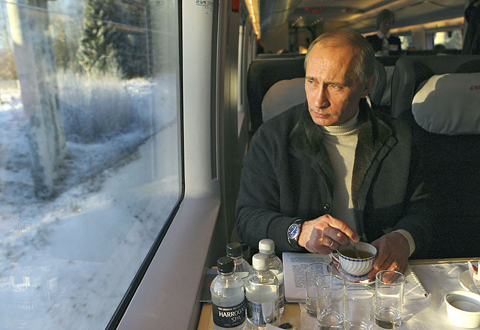Famed for the legendary trains that clank across seven time zones on its Trans-Siberian railroad, Russia this week entered the modern railway age with its first high-tech express train.
The Sapsan train, whose gaudy red bodywork is in sharp contrast to the bottle green that adorns most Russian trains, started running on Thursday on the route between Moscow and St Petersburg.
The route between the country’s two main cities was until now largely served by overnight trains which shared the same romance as the Trans-Siberian railway but crawled to their destination in some eight hours.

PHOTO: REUTERS
But now travelers can take the Sapsan (Peregrine Falcon), which cuts journey time between the two cities to just three hours and 45 minutes and appears set to revolutionize the Russian concept of train travel.
It is a centerpiece of Russia’s plans to modernize its state-owned railways and integrate a network that extends as far afield as China and Mongolia with the railway systems of Europe.
For all the fanfare, the unveiling of the new pride of Russia’s railways was overshadowed by the deadly bombing of the luxury Nevsky Express train last month on the same Moscow-Petersburg railway.
The blast late on Nov. 27 derailed the Nevsky Express, killing 27 people and wounding about 100 more. It was claimed by the so-called “Caucasus Emirate,” an umbrella group uniting various militant Islamist factions.
By chance, part of the Sapsan was undergoing tests close to where the blast hit and was involved in rescue efforts, carrying several hundred stranded passengers away from the site of the attack.
In the Soviet-era train stations of Moscow and St Petersburg, the Sapsan train looks like it has arrived from another planet as it sits in the tracks next to its long-serving Russian-built brethren.
The train was designed by German engineering giant Siemens, which in 2006 signed a contract with Russian Railways (RZhD) to supply eight of its Velaro trains, in the latest example of German-Russian economic cooperation.
It has a highest speed of 250kph for the 635km journey, an almost rocket-like velocity compared with the trudge of most Russian trains.
Previous day trains along the route had taken four and a half hours.
The contrast with Russian trains of the past is even more striking inside with automatic doors, huge glass picture windows and innovations like television in first class.
Even more astonishing for anyone who has traveled on Russian trains in the past is the blanket ban on smoking, a major irritant for many train travelers in the country.
“It feels like a TGV!” exclaimed Mikhail, 43, as he climbed aboard in Moscow, referring to the French high speed train that transformed Europeans’ expectations of rail travel.
Alexei, 28, an IT consultant, decided to buy a one-day return ticket for one of the first journeys for the sheer pleasure of traveling on the train.
“When I compare with other Russian trains, I see that our railways have moved on to another level,” he said.
The cost is set at US$115 for a single and US$175 in first class.

Swedish campaigner Greta Thunberg was deported from Israel yesterday, the Israeli Ministry of Foreign Affairs said, the day after the Israeli navy prevented her and a group of fellow pro-Palestinian activists from sailing to Gaza. Thunberg, 22, was put on a flight to France, the ministry said, adding that she would travel on to Sweden from there. Three other people who had been aboard the charity vessel also agreed to immediate repatriation. Eight other crew members are contesting their deportation order, Israeli rights group Adalah, which advised them, said in a statement. They are being held at a detention center ahead of a

A Chinese scientist was arrested while arriving in the US at Detroit airport, the second case in days involving the alleged smuggling of biological material, authorities said on Monday. The scientist is accused of shipping biological material months ago to staff at a laboratory at the University of Michigan. The FBI, in a court filing, described it as material related to certain worms and requires a government permit. “The guidelines for importing biological materials into the US for research purposes are stringent, but clear, and actions like this undermine the legitimate work of other visiting scholars,” said John Nowak, who leads field

Former Nicaraguan president Violeta Chamorro, who brought peace to Nicaragua after years of war and was the first woman elected president in the Americas, died on Saturday at the age of 95, her family said. Chamorro, who ruled the poor Central American country from 1990 to 1997, “died in peace, surrounded by the affection and love of her children,” said a statement issued by her four children. As president, Chamorro ended a civil war that had raged for much of the 1980s as US-backed rebels known as the “Contras” fought the leftist Sandinista government. That conflict made Nicaragua one of

NUCLEAR WARNING: Elites are carelessly fomenting fear and tensions between nuclear powers, perhaps because they have access to shelters, Tulsi Gabbard said After a trip to Hiroshima, US Director of National Intelligence Tulsi Gabbard on Tuesday warned that “warmongers” were pushing the world to the brink of nuclear war. Gabbard did not specify her concerns. Gabbard posted on social media a video of grisly footage from the world’s first nuclear attack and of her staring reflectively at the Hiroshima Peace Memorial. On Aug. 6, 1945, the US obliterated Hiroshima, killing 140,000 people in the explosion and by the end of the year from the uranium bomb’s effects. Three days later, a US plane dropped a plutonium bomb on Nagasaki, leaving abut 74,000 people dead by the